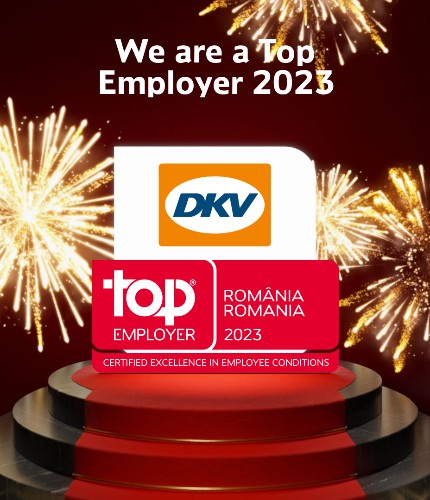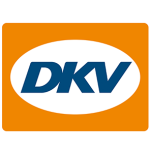Cristian Tatoiu is Cloud Engineer by position and cloud enthusiast by heart and he knows: The simple “I have a question… request” are most of the time the biggest and funniest endeavors.
As customers, we all are in touch with products and services. We use a service, see the dashboard, push a button and are happy that our data was just send around the globe within a fingertip. But how that works, which processes are part of it – let’s admit it – we often just don’t know. Actually, it’s employees like Cristian Tatoiu who make things like this possible. They are the ones thinking about the solutions behind, the data architecture that is needed. A stable running dashboard? Secured stored date? - Cristian has been Cloud Engineer at DKV Mobility for almost one year now. For us, he will take a look behind the surface and share with us what a Cloud Engineer is actually doing and why his work is closely linked to the company’s strategy and the creation of value for its customers.
“I’m Cristian. I live in Romania and I am a Cloud Engineer in the DKV Mobility Platform Team. To already spoil you, I couldn’t be any happier about making the move from a more traditional Managed Service Provider to a cloud-only, agile IT organization like DKV Mobility. But first things first. Let’s start this report, like I start my day: Get a coffee.
First thing in the morning - after a workout at the gym or running exercise – I check my emails, while enjoying the first cup. In addition, I run a quick check on the nightly control of our infrastructure like our databases, virtual machines, pipelines and check all the alerting and monitoring tools. Since we have a 24x7 support partnership with the DevOps (Development & Operations) team of the OEDIV GmbH, Germany, a long-term partner of our company, we do not have to worry about being called in the middle of the night for emergency alerts. I also check, if there have been any requests for support or information from our product teams all over Europe. Because of the different time zones – in Romania I am 1 hour ahead of my colleagues in our headquarters in Ratingen, Germany - I can sometimes surprise them by already having their answers ready as soon as they start their working day.
As cloud engineer, I am working in the Customer Product Services department (CPS). Here we are concentrated in the Platform Team, focusing our scalable Azure Cloud Infrastructure, helping all product teams in providing best in class developer solutions. For all who don’t know what Azure means, it’s a service created by Microsoft to provide cloud computing for creating and managing applications and services using a cloud environment.
Two main tasks are characterizing the mission of our platform team: Support and consult. We are supporting the product teams in their daily work to create valuable services for the customers and we are giving consult in best practices regarding cloud resources, monitoring solutions and deployment configurations to further develop the platform itself.
As we have flexible working hours, we normally start the team day with a meeting around 9 to 10 AM in the morning. This meeting we take to quickly update each other, provide status on current issues, and assign work from our backlog. As we are working partially remote and in different locations all over Europe, it’s important to keep each other informed about task and priorities. In addition, we once a week have a meeting for the Weekly Planning. This is used to discuss outstanding topics of the week and focus on projects that require more workforce or time. What I also like are the monthly Team Retros that are hosted by a Scrum Master. This Retros are all about how we work with each other. They focus on our internal processes and on how we can improve ourselves as a Team. A weekly DevOps Community of Practice meeting is used to update us with the specific Product Teams and their respective DevOps’. Here we discuss topics and issues than can have a broader impact for the company. Sounds like a lot of meetings I know, but actually all of them are useful for. Especially also the last meeting I want to mention. Last but not least, the bi-weekly 1-on-1 meeting with my Team Manager. Here I have the opportunity to exchange open and honest feedback, address issues, talk about ideas or opportunities.
If we dive into my daily routines, the actual work can be broken down in four categories:
- Incidents
- Requests
- Projects
- Side quests (often challenging but fun)
Let us walk through together. If incidents occur, we need quick actions. We immediately jump in, get in problem-solving modus and fix the issue. We get confirmation, close the issue and document the incident if needed. To keep a good overview, for our ticket management the tool Jira has itself proven very useful. For documentation we use Confluence.
Since we are using mostly Microsoft Azure managed services, there are not a lot of incidents as Azure has proven itself to be extremely reliable and resilient. Specifically, the Azure Kubernetes Service and the Flexible PostgreSQL servers, both of which constitute our backbone, have proven themselves time and again, with very little management overhead.
Requests come in various forms and sizes. It can be a simple request for info, a walkthrough for a new joiner, a Pull Request approval, a deployment or a new type of resource that the Product Teams requires. At DKV Mobility the recently rolled out self-service pipeline is making our lives much easier as a lot of request for resources like databases, storages or servers can now be serviced by the developers or the DevOps engineers themselves. That means we increase the time we have available for value creating opportunities and decrease time to market new features and services. By that we have the advantage that instead of slow manual activities, our software can be much faster in creating new services and features for the customers.
We are dealing with a lot of smaller and bigger Projects. Whether it is about identifying the right tools or technologies for the task at hand or improving the current usage to make the most of the available toolset, we are constantly striving to improve our platform in regards of scalability, resilience and efficiency. Currently, for example, we are moving our single servers for PostgreSQL-databases to new more flexible servers to reduce maintenance effort and increase high availability functionality. This means that the migrations steps must be coordinated for all product teams across all our environments. And of course, for all databases and servers – and that without any implications for our customers. This task requires a very close interaction with the DevOps engineers in the product teams. Which is good, as we aim to interweave as much as possible with the product teams. As a motivating result, we can provide our customers less downtime, more security and higher reliability for our DKV COCKPIT (our customer portal).
Side quests are normally those funny and challenging endeavors that start with a message or call from a colleague saying “I have a question…” and usually end after six hours of working through logs, several calls with you team, reaching out to other teams until finally we end the day not only with a solved problem but also with increased knowledge.
Besides projects, incidents or challenging endeavors, learning is part of my daily work life. In an industry that changes as fast as the IT industry, you are going backwards, if you aren’t moving forward. As employees, we have access to several online training providers. That’s why I always have a tab open- mostly on A Cloud Guru or LinkedIn Learning. By this I am always ready to start a 5–10-minute learning session whenever the opportunity presents. For me, it is like this: If you want to be at peak performance, you must put in some extra hours in self-improving every day. It’s just like with a professional athlete: You need to train in order to get better and refine your skills all day, every day.”




































